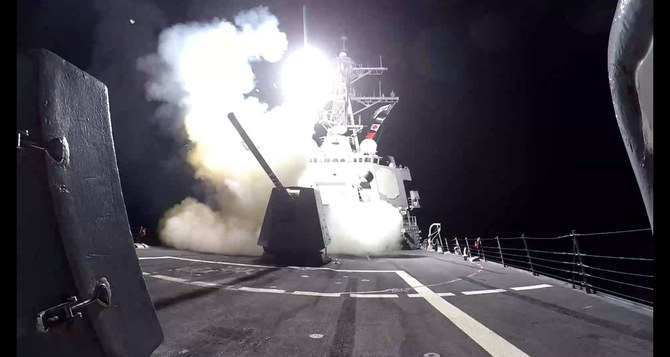AL-MUKALLA: The US Central Command said on Sunday that its forces had destroyed two remotely controlled explosive-laden boats of the Houthis and their three anti-ship cruise missiles in Yemen’s western province of Hodeidah.
This came as the Yemeni militia greatly reduced its Red Sea strikes during the previous 96 hours.
The US military launched strikes on Saturday afternoon, hitting two bomb boats, also known as unmanned surface vessels, and three mobile anti-ship cruise missiles north of Hodeidah, thwarting Houthi assaults on ships in the Red Sea, according to a CENTCOM post on X.
“CENTCOM identified these USVs and missiles in Houthi-controlled areas of Yemen and determined they presented an imminent threat to US Navy ships and merchant vessels in the region,” it said.
The Houthis said on Saturday that the US and UK conducted three attacks in the Al-Salif region, northwest of Hodeidah.
On Saturday, CENTCOM said that it had destroyed two explosive-laden Houthi drone boats as well as five cruise missiles that had been prepped for fire against US and international commercial and naval ships in the Red Sea on Friday.
The latest barrage of US strikes on Houthi-controlled Hodeidah came as the Iran-backed militia has yet to claim responsibility for new attacks on ships in the Red Sea, Bab Al-Mandab, and the Gulf of Aden, despite their leaders’ threats to launch missile and drone attacks on Israel, US, and UK-linked ships until Israel ends its siege of Gaza and the US and UK cease their strikes on their territory.
The UK Maritime Trade Operations agency, which documents ship assaults, has issued no fresh maritime security alerts since Tuesday.
Since November, the Houthis have launched remotely controlled drone boats, explosive-laden drones, and ballistic missiles at commercial and navy ships in the Red Sea and other international waters off Yemen in what the Yemeni militia claims are actions in support of Palestine and to force Israel to lift its siege on Gaza.




























